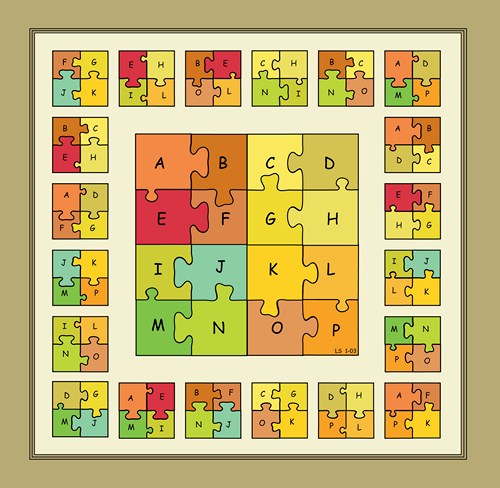A man presents himself as the The Amazing Sand Counter. He claims that if you put some quantity of sand into a bucket, he will know at a glance how many grains there are, but he won’t tell you the number. Can you devise a test that can verify this ability without telling you anything that you don’t already know? You can ask the Sand Counter to leave the room or turn away, for example, and you can ask him questions. How can you convince yourself that he knows how many grains of sand are in the bucket when he won’t actually tell you the number?
Author: Greg Ross
Self-Test

Xavier Henry Leder, who declares himself “by profession a seaman,” patented this “foul breath indicator” in 1902, perhaps after inventing it for his own use.
“It is an appliance in the shape of a tube, made of any non-absorbent material and curved so as to transmit without any obstruction the breath from the mouth to the nostrils. … By breathing from the mouth through the tube any foulness or unpleasant state of the breath may be readily detected by the sense of smell.”
The hard part is exhaling and inhaling at the same time.
Unquote
“The greatest deception men suffer is from their own opinions.” — Leonardo
“Convictions are more dangerous enemies of truth than lies.” — Nietzsche
“Opinions have caused more ills than the plague or earthquakes on this little globe of ours.” — Voltaire
“The most difficult subjects can be explained to the most slow-witted man if he has not formed any idea of them already; but the simplest thing cannot be made clear to the most intelligent man if he is firmly persuaded that he knows already, without a shadow of doubt, what is laid before him.” — Tolstoy
“Nothing is so firmly believed as that which we least know.” — Montaigne
“Opinions are made to be changed, or how is truth to be got at?” — Lord Byron
“Nothing is more conducive to peace of mind than not having any opinions at all.” — G.C. Lichtenberg
Encounter

We had a dark grey cat (Norfolk bred, very Norfolk in character) called Tom. He was reserved, domineering, voluptuous — much as I imagine Tiber to be. When he was middle-aged he gave up nocturnal prowlings and slept on my bed, against my feet. One evening I was reading in bed when I became aware that Tom was staring at me. I put down my book, said nothing, watched. Slowly, with a look of intense concentration, he got up and advanced on me, like Tarquin with ravishing strides, poised himself, put out a front paw, and stroked my cheek as I used to stroke his chops. A human caress from a cat. I felt very meagre and ill-educated that I could not purr. It had never occurred to me that their furry love develops from what was shown them as kittens.
— Sylvia Townsend Warner, letter to David Garnett, June 18, 1973, quoted in The Oxford Book of Friendship
A Magic Jigsaw

A “self-interlocking” geomagic square by Lee Sallows. The 16 lettered pieces pave a single large square, and smaller squares can be produced by various groups of four pieces — those drawn from each row, column, and long diagonal, and 10 other symmetrically chosen quartets.
In a Word

greenswardsmanship
n. the cultivation of an unusually and enviably excellent lawn
Where’s the Father?
A mother is 21 years older than her son. Six years from now, she will be five times his age. Where’s the father?
I won’t give the answer to this one — if you do the math, you’ll know precisely where he is.
Podcast Episode 25: An Australian Enigma
On Dec. 1, 1948, a well-dressed corpse appeared on a beach in South Australia. Despite 66 years of investigation, no one has ever been able to establish who the man was, how he came to be there, or even how he died.
In this episode of the Futility Closet podcast we’ll delve into the mystery of the Somerton man, a fascinating tale that involves secret codes, a love triangle, and the Rubaiyat of Omar Khayyam. We’ll also hear Franklin Adams praise the thesaurus and puzzle over some surprising consequences of firing a gun.
Fiction and Feeling

A puzzle from University of Michigan philosopher Kendall Walton:
“Charles is watching a horror movie about a terrible green slime. He cringes in his seat as the slime oozes slowly but relentlessly over the earth, destroying everything in its path. Soon a greasy head emerges from the undulating mas, and two beady eyes fix on the camera. The slime, picking up speed, oozes on a new course straight toward the viewers. Charles emits a shriek and clutches desperately at his chair. Afterwards, still shaken, he confesses that he was ‘terrified’ of the slime.”
Was he? Walton says no. Charles may have felt intense fear, even shrieking as the slime approached the camera. But he knew that he was not literally in danger. This was not a half-belief or a “gut” feeling — he never considered leaving the theater or calling the police, for instance. Charles wasn’t motivated to avoid the slime physically. Yet he says that what he felt was fear of the slime.
What are we to make of this? “This issue is of fundamental importance,” Walton writes. “It is crucially related to the basic question of why and how fiction is important, why we find it valuable, why we do not dismiss novels, films, and plays as ‘mere fiction’ and hence unworthy of serious attention.” What is the answer?
(Kendall Walton, “Fearing Fictions,” Journal of Philosophy, January 1978.)
A Painting Conundrum

From Stephen Barr’s Experiments in Topology (1989) via Miodrag Petkovic’s Mathematics and Chess (1997):
This apartment contains eight rooms, each measuring 9 square meters, except for the top one, which measures 18 square meters. You have enough red paint to cover 27 square meters, enough yellow paint to cover 27 square meters, enough green paint to cover 18 square meters, and enough blue paint to cover 9 square meters. Can you paint the eight floors in four colors so that each room neighbors rooms of the other three colors?

